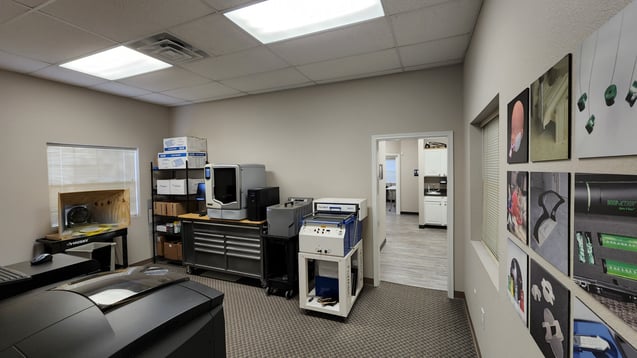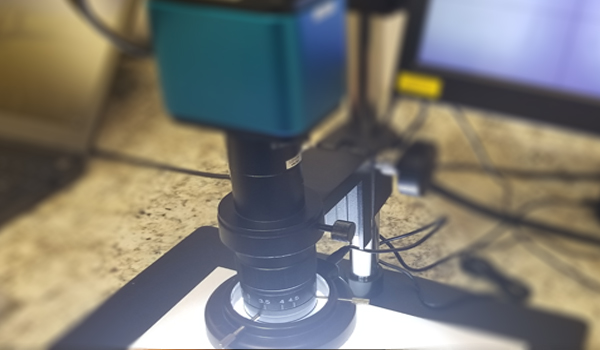At Zewski, we use more than just CAD, simulation, industrial design, and project management software to develop new products. We have 4000 sq-ft of engineering, test, print and lab space, full of high-tech equipment and development tools that we can use to prototype new designs and perform characterization testing.
In fact, it is this hands-on approach to design, that has made Zewski so successful in the field of medical device development. A computer model can only go so far in telling you what you need to know about how a design will come together and perform. Let us share with you a bit about our in-house playground for our staff.
Our Capabilities: FDM Technology: We use a Stratasys FDM (fusion deposition modeling) technology to print ABS plastic parts – this creates parts using layers of .010” or .013” thickness, and is optimal for use with designs that require durable and functional parts, manufactured from a heat stable polymer that does not require a watertight structure. We use this printer to print mainly for evaluating test fixturing and jigs for inspection and production.
FDM Technology: We use a Stratasys FDM (fusion deposition modeling) technology to print ABS plastic parts – this creates parts using layers of .010” or .013” thickness, and is optimal for use with designs that require durable and functional parts, manufactured from a heat stable polymer that does not require a watertight structure. We use this printer to print mainly for evaluating test fixturing and jigs for inspection and production.
PolyJet Technology: Our Objet Connex3 (Objet, also a Stratasys brand), builds dental grade biocompatible parts, as well as parts from urethane, that replicate Acrylic, ABS and Polypropylene-like plastics. It can print multi-texture, hardness from shore 40-90 and across the RGB color spectrum in a solid watertight design. This high-resolution printer creates parts optimal for use with small moving assemblies and designs with thin walls, snap-fit parts like medical housings, and is ideal for printing from scans and demonstrating medical device functionality.
SLA Technology: We use a high resolution Formlabs SLA (stereolithography) printers to print plastics that can be elastic TPE-like or rigid acrylic to PVC-like. This printer also supports a wide range of medical grade materials and materials used in dentistry. In addition, the SLA printer technology also allows us to print near water clear and translucent parts. With a resolution of 25 µm in the x-y plane it is optimal for use with prototyping medical disposables and soft parts.
In our 3D printing lab, we also have an SCA (support cleaning apparatus), Form Wash washer and a UV Curing station for removing support and curing parts that require additional UV exposure. Our ability to use our own printers easily take weeks, if not months, off a development project timeline with a higher degree of design quality.
Machining: Our local prototype machining partner, Saldana Designs, has CNC milling to create tooling fixtures, production jigs and equipment as well as machinable plastic or metal designs, allowing us to machine a wide variety of items to an accuracy of 0.001”. Running open-source controllers which gives us the flexibility to use G-Code generators such as MasterCAM and SolidWorks CAM. Having the capability to machine close by, provides many advantages including faster turnaround, more accurate designs and eliminates the need to outsource work to larger shops, which reduces time and cost.
Urethane Molding: Over the years we have developed our ability to create urethane prototypes which serve as an option to low volume production-like prototypes. This lab, dedicated, to creating a wide variety of concept models using various materials including silicone, polyurethane, and foam, allow us to specialize in developing sample molds for repetitive model production. Using 3D printed mold components, and an extensive mold casting process, we can create parts ranging from simple to elaborate detail casted models. This process is an art, not learned in college, but in the lab and working with experts on materials, such as vendor, Reynold Advanced Materials, who have become a valuable resource to our design team.
Finishing and Assembly: At Zewski Corp. we have the ability to UV bond plastic parts using our Dymax and Henkel dispensing systems, and Blue Wave LED wands and conveyor motion UV spot technology. And when it comes to packaging, we use Formech vacuum forming technology and pad printing capabilities.
Design Verification Testing: In our testing lab, we have a full range of equipment that allows us to perform verification testing for new designs including mechanical and destructive testing, pressure, and fluid testing, accelerated aging testing, and environmental testing. In addition, we can perform precise dimensional analysis, we can test for material hardness/durometer, and conduct basic electrical testing.
Mechanical Load: For force and tension applications like adhesive or destructive testing, we have a Validyne load sensors, Extech Force Gauges, and a Shimpo FGS-100 PVH test stand, in combination with weight sets, tooling machined or 3D printed in-house, to subject new or existing designs to various mechanical and destructive testing.
Flow and Pressure: We also have the ability to conduct pressure and flow testing for a wide range of fluid systems. Using our many pressure and flow devices measuring from low as .1 mm of water pressure and 1 L/m flow to our high pressure regulators and gauges for our 3000# air supply tanks and 100L/m flow regulators (although admittedly, as medical device design firm, we seldom have to test anything with pressure much higher than the human body).
Environmental: For accelerated aging and environmental testing, we have an Ohio Care Plus incubator, Respironics Ventilators, Fisher Paykel Heater/Humidifiers, an Environmental Chamber, Pressure Chamber, Vacuum Chamber, Infrared Thermometer, a Humidity Meter, and both UV and White light meters.
Electrical: Although we have limited capability for electrical testing and evaluation, we defer to our electrical engineering partner Cooper Consulting Service in Friendswood, Texas for the majority of our Electrical Engineering support.
Inspection: We can conduct precise dimensional analysis on a wide range of cast, machined, 3D printed, injection molded, thermo-formed, or extruded parts using our Mitutoyo micrometer, Mitutoyo digital calipers, VCI pin gauge set, our 600-1200X Zoom digital microscope. We can also test for material hardness with our GE digital and Rex Analog durometer testers.
Engineer’s Playground: We acknowledge our lab as an engineer’s playground, but it's also important to note everything used in our lab for testing is calibrated annually and maintained in the highest of condition.
For over 19 years, our entire team has had the full power of SolidWorks (automated design software), Adobe Creative Cloud Suite (for visual applications), and all Office and Wrike (Project Software) tools at their disposal. They also have access to these additional resources based on their roles: CFD (computational flow dynamic) software, FEA (finite element analysis) software, PoserPro Human Anatomy software, Rhino industrial design software, Visualize and V-Ray Rendering Technology for photo-realistic rendering, and last, but by no means least, an onsite PDMWorks data management server vault, to keep all confidential designs safe and secure from the outside world.

